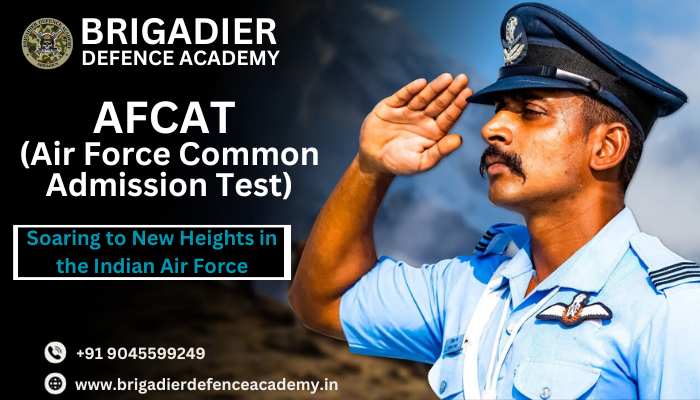Introduction Air Force:
The Air Force Common Admission Test (AFCAT) serves as a pivotal gateway for aspirants with dreams of soaring through the skies and contributing to the defense prowess of the Indian Air Force (IAF). This highly competitive examination evaluates candidates for commissioning in various branches of the Air Force, reflecting the IAF’s commitment to attracting and nurturing top-tier talent. Beyond being a test of academic aptitude, AFCAT assesses leadership potential and a deep-seated commitment to serve in the dynamic realm of aerospace and defense.
Eligibility and Exam Pattern:
To embark on the journey facilitated by AFCAT, candidates must meet specific eligibility criteria, ensuring a blend of educational qualifications and age appropriateness. The examination, conducted twice a year, serves as a comprehensive assessment of candidates’ abilities in multiple domains. The AFCAT exam pattern encompasses multiple-choice questions covering General Awareness, Verbal Ability, Numerical Ability, and Reasoning. Successful candidates proceed to subsequent rounds, including the Air Force Selection Board (AFSB) interview, a critical phase evaluating not only academic prowess but also the officer-like qualities crucial for a career in the Air Force.
Branches and Opportunities:
One of the distinctive features of AFCAT is its ability to open doors to diverse branches within the Indian Air Force, each catering to unique skill sets and career aspirations. Aspirants with a passion for piloting can aim for the Flying Branch, where rigorous training transforms them into skilled aviators responsible for safeguarding the nation’s airspace. The Ground Duty (Technical) branch beckons engineers and technical experts, where innovation and problem-solving skills are paramount. Simultaneously, the Ground Duty (Non-Technical) branch encompasses fields like Administration, Logistics, and Accounts, offering opportunities for those with diverse talents and expertise.
Challenges of AFCAT Preparation:
Preparing for AFCAT demands a strategic and disciplined approach, encompassing thorough subject knowledge, time management, and adept problem-solving skills. Candidates aspiring to clear AFCAT must stay abreast of current affairs, possess a strong grasp of numerical concepts, and cultivate effective communication skills. The extensive AFCAT syllabus requires a dedicated study routine, and candidates must be equipped to tackle diverse question formats. The challenges of AFCAT preparation go beyond academics; they include cultivating a mindset of discipline, adaptability, and determination.
AFCAT Selection Process:
The AFCAT selection process goes beyond written examinations, emphasizing a holistic evaluation to identify candidates who not only possess academic excellence but also exhibit qualities integral to Air Force officers. The Air Force Selection Board (AFSB) interview is a critical component, delving into leadership, communication skills, adaptability, and problem-solving ability. The interview is complemented by group tasks, psychological tests, and personal interviews, collectively determining a candidate’s suitability for commissioning. This multifaceted selection process ensures that individuals entering the Air Force through AFCAT are not just academically qualified but also possess the demeanor and attributes essential for leadership roles.
Life as an AFCAT Officer:
Commissioned officers selected through AFCAT undergo specialized training programs designed to prepare them for the unique challenges of Air Force life. The training varies according to the branch, with Flying officers undergoing extensive flying training, technical officers delving into advanced aerospace technologies, and non-technical officers contributing to diverse administrative and support functions. Life as an AFCAT officer is characterized by a sense of purpose, camaraderie, and the opportunity to contribute to the nation’s defense capabilities. The responsibilities and roles assigned to AFCAT officers are diverse, reflecting the multifaceted nature of modern air warfare.
The life of a Flying officer involves not just mastering the art of flying but also continuously upgrading skills, staying at the forefront of technological advancements, and being prepared for rapid decision-making in high-pressure situations. Technical officers, on the other hand, are at the forefront of aerospace innovation, working with cutting-edge technologies to ensure the operational readiness of the Air Force. Non-technical officers in roles such as Administration, Logistics, and Accounts play pivotal roles in ensuring the smooth functioning of Air Force bases, contributing to the overall efficiency and effectiveness of Air Force operations.
Beyond the Uniform:
AFCAT extends its impact beyond the boundaries of the Air Force uniform. The training, discipline, and values instilled in AFCAT officers during their service tenure often shape their contributions to society at large. Many AFCAT alumni have ventured into various fields, excelling as leaders and influencers. Their experiences in the Air Force, coupled with the leadership skills acquired through AFCAT, position them as assets in diverse sectors, contributing not only to national defense but also to nation-building.
Challenges Faced by AFCAT Officers:
While life as an AFCAT officer is rewarding, it is not without its challenges. The dynamic and unpredictable nature of military operations demands resilience, adaptability, and a commitment to continuous learning. AFCAT officers are often deployed to diverse and challenging environments, requiring them to operate efficiently in varying conditions. The responsibility of safeguarding the nation’s airspace and contributing to its defense is a monumental task that comes with its share of sacrifices and pressures.
Commemorating Success Stories:
The success stories of AFCAT officers are woven into the tapestry of the Indian Air Force’s legacy. These officers, who started their journey through a competitive examination, have gone on to achieve remarkable milestones. From leading air operations to contributing to technological advancements, AFCAT officers have left an indelible mark on the Air Force’s history. Their stories inspire the next generation of aspirants, instilling a sense of pride and determination in those who dream of donning the blue uniform.
Conclusion:
In conclusion, the Air Force Common Admission Test (AFCAT) serves as a beacon for individuals aspiring to reach new heights in their careers and contribute to the defense and security of the nation. Beyond being a mere examination, AFCAT represents a transformative journey, turning passionate aspirants into commissioned officers embodying the values of integrity, service, and leadership. As AFCAT continues to evolve, it remains a testament to the Indian Air Force’s commitment to excellence and its unwavering dedication to nurturing leaders who soar to new heights in the proud blue uniform.







